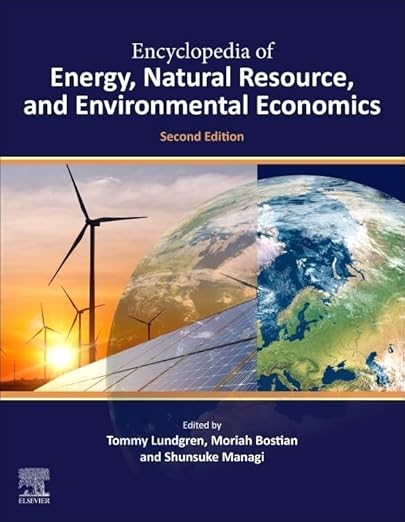New major reference work (MRW) out on Elsevier with vital CERE contributions both in terms of editorial leadership and authorship. Tommy Lundgren and Moriah Bostian, both affiliated with CERE, acted as editor-in-chief (and chapter authors) and contributions to the volume were made by Bengt Kriström (chapter author and section editor Energy), Shuyi Wang, Adan Martinez Cruz, and Chandra Krishnamurthy.

Welcome to the second edition of the Encyclopedia of Resource, Energy, and Environmental Economics. Our goal has been to assemble the most comprehensive and insightful knowledge on how economics can drive and refine energy policy, environmental protection, and natural resource management. By this, we mean applying economic principles to help society maximize the value of our limited natural resources—whether through sustainable development, conservation, or preservation.
In a time when resource scarcity, environmental degradation, and energy challenges are more urgent than ever, the role of economics in addressing these issues is critical. This collection of articles has been carefully curated to provide an authoritative introduction to the complex and interrelated economic challenges that our planet faces. We believe this edition offers a robust foundation for understanding how economic tools can be applied to create solutions that balance growth with sustainability.
With contributions from 128 leading international scholars, this Encyclopedia offers a unique online reference that is designed to complement the body of academic knowledge found in journals, handbooks, and textbooks. We hope that this resource will become an essential cornerstone for scholars, policymakers, and practitioners working at the intersection of economics, energy, and the environment.
- The Energy section presents 31 new or updated chapters on removal of fossil fuels, electrification and emission pricing in developing countries, prosumers of energy, decarbonizing industries, energy efficiency in the EU and China, green energy jobs, power outages and electricity storage, and digitalization and energy sustainability.
- The Resources section presents 30 new or updated chapters that include a range of resources, including fisheries, forests, water, land, soil, and ecosystem services, as well as methodological advances related to spatial modeling, climate modeling, productivity, and experiments.
- The Environmental section presents 33 new or updated chapters for green tax, social cost of greenhouse gases, prices versus quantities, pricing for public goods and experimental auctions, adaptation to climate change, voluntary and information disclosure approaches, carbon farming, ethics, pesticide use, and well-being.
Editors-in-chief:
Tommy Lundgren, CERE and SLU, Umeå, Sweden
Moriah Bostian, CERE and Lewis & Clark, Portland (OR), USA.
Shunsuke Managi, Urban Institute, Kyushu University, Fukuoka, Japan

